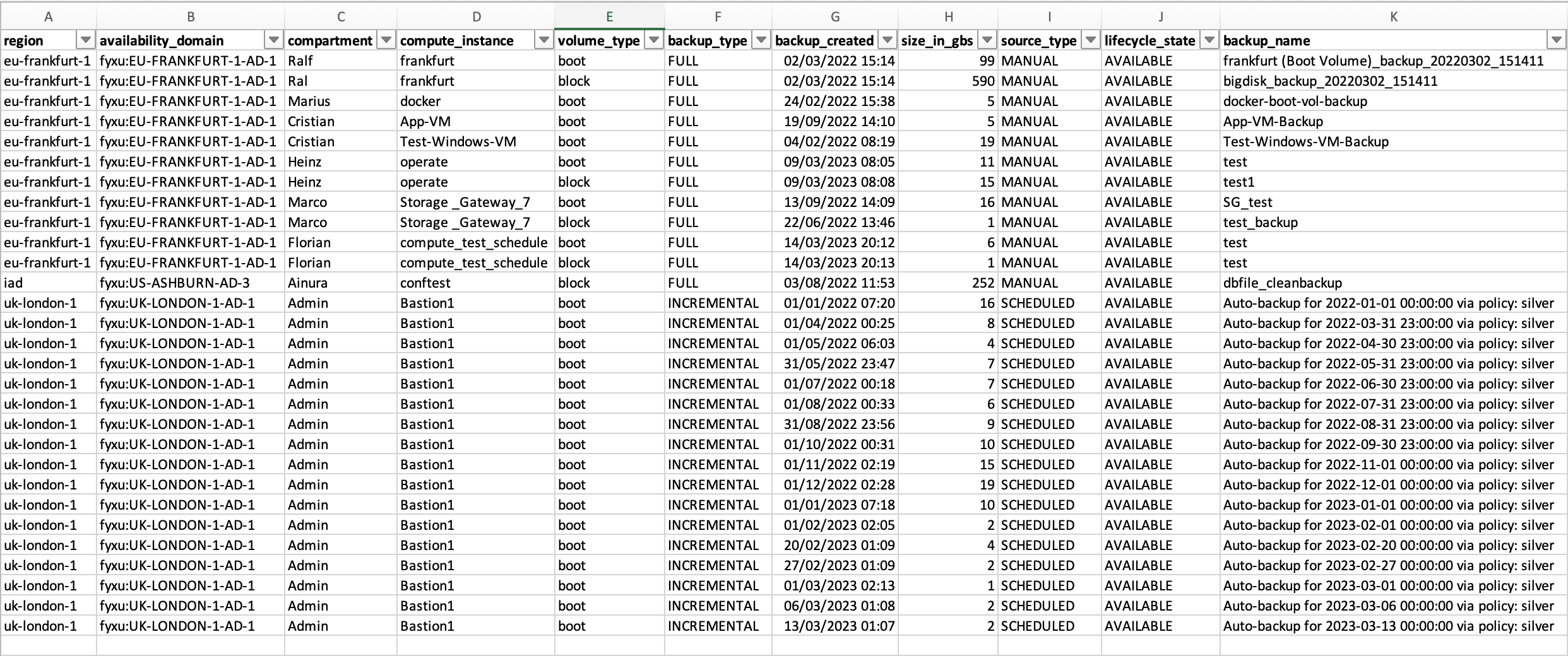ShowBackups is a demonstration script showing you how to list compute instance backups (boot & volumes).
curl https://raw.githubusercontent.com/Olygo/OCI-ShowBackups/main/install.sh | bash
- install dependencies
- clone git repo locally
- schedule cron everyday at 8AM
-
ShowBackups :
- searches for compute instances
- retrieves all attached volumes
- lists all volume backups found
- generates csv report
- stores csv report in an oci bucket
-
Support for using the script with Instance Principals. Meaning you can run this script inside OCI and when configured properly, you do not need to provide any details or credentials
-Parameters for execution:
-cs authenticate through CloudShell Delegation Token
-cf authenticate through local OCI config_file
-cfp config_file change OCI config_file path, default: ~/.oci/config
-cp config_profile indicate config file section to use, default: DEFAULT
-c compartment_ocid compartment to store the bucket report, default: root
-b bucket_name bucket name to store the report, default: reports_YOUR_TENANT_NAME
-rf report_folder local folder path to store the report, default: ~
-rn report_name name of the csv report, default: compute_backups_CURRENT_DATE_TIME
-nocloud if used: do not store csv report on OCI, default: False
-tlc compartment_ocid scan only a specific compartment, default: scan from root compartment
-rg region_name scan only a specific region, default: scan all regions
-h, --help show this help message and exit
-
Use an existing VCN or create a dedicated vcn (preferred) in a public or a private subnet (preferred if vpn or fastconnect)
-
Create a free-tier compute instance using the Autonomous Linux 7.9 image
-
Create a Dynamic Group called OCI_Scripting and add the OCID of your instance to the group, using this command:
ANY {instance.id = 'OCID_of_your_Compute_Instance'}
-
Create a root level policy, giving your dynamic group permission to manage resources in tenancy:
-
you can use :
allow dynamic-group OCI_Scripting to manage all-resources in tenancy -
but the following statements are sufficients:
allow dynamic-group OCI_Scripting to read all-resources in tenancy allow dynamic-group OCI_Scripting to manage object-family in tenancy where any {request.permission='BUCKET_CREATE', request.permission='OBJECT_CREATE', request.permission='OBJECT_OVERWRITE'}
-
-
Login to your instance using an SSH connection
-
Run the following commands:
- sudo yum update -y
- sudo yum install git -y
- python3 -m pip install oci oci-cli --user
- git clone https://github.com/Olygo/OCI-ShowBackups.git
- cd ./OCI-ShowBackups
- python3 OCI-ShowBackups.py
python3 ./OCI-ShowBackups.py
without arguments OCI-ShowBackups tries to authenticate using Instance Principals
python3 ./OCI-ShowBackups.py -cf
python3 ./OCI-ShowBackups.py -cf -cfp /home/opc/myconfig -cp MyDomain
python3 ./OCI-ShowBackups.py -cs
python3 ./OCI-ShowBackups.py -cf -rg eu-paris-1 -tlc ocid1.compartment.oc1..aaaaaaaaurxxxx -b data_bucket -rn backups_of_my_instances
python3 ./OCI-ShowBackups.py rg eu-frankfurt-1 -nocloud -rf /home/opc/data/ -rn backups_of_my_instances
Please test properly on test resources, before using it on production resources to prevent unwanted outages or unwanted bills.

